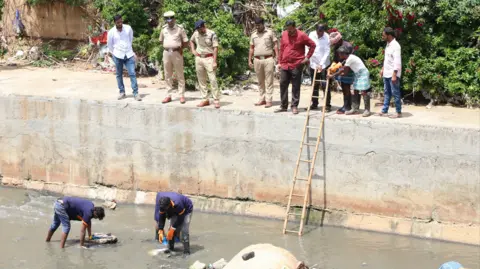Indian film star arrested in connection with fan’s murder case
Darshan Thoogudeepa, a superstar of the Kannada-language film industry in the southern Indian state of Karnataka, has been under arrest for the past 10 days in connection with a crime that resembles the plot of a movie.
He is among 17 people picked up by the police for the murder of Renukaswamy - a 33-year-old fan of the actor – after his body was recovered from a drain.
Earlier this week, Bengaluru city Police Commissioner B Dayananda said Renukaswamy was “killed in a very brutal and barbaric way” and described it as a “heinous crime committed in a horrific manner ”.
Police said they believe the 47-year-old actor was angry with Renukaswamy, who worked for a pharmacy company, because he had allegedly sent lewd messages on social media to Pavithra Gowda, an actress who has been described in the Indian press as Darshan’s girlfriend. She is among those arrested.
The charges against the suspects include “murder, kidnapping, destruction of evidence and criminal conspiracy”.
Darshan is in jail and has not commented on the allegations but his lawyer Ranganath Reddy told the BBC that during their meetings, the actor denied the charges against him.
“These are mere allegations at the moment,” he said. “The police have no direct evidence against Darshan. It’s a case of circumstantial evidence.” Mr Reddy also called claims that Pavithra was married to Darshan “a blatant lie”.
Regarded as the most bankable star of the Kannada film industry, Darshan has starred in about 60 films and many of them have been huge hits.
“He’s the biggest star in the Kannada film industry, with a huge fan following. His face is plastered behind auto-rickshaws and new releases of his films see fans pouring milk on his hoardings,” says film critic S Shiva Kumar.
Kannada film producer Yogish Dwarakish says Darshan is "one actor who can guarantee you an extraordinary opening".
“His films release in 600-700 screens in 400 theatres. His fans worship him. He’s a star who delivers every single time. His latest, Kaatera, grossed more than 1bn rupees ($12m; £9.4m) and was a mammoth hit.”
Reports say he charges 200-250 million rupees for a role – a figure unheard of in the local film industry, where films usually have small budgets and a majority don’t even get released in the neighbouring southern states.
So, it’s not surprising that since 11 June - when the police turned up at the hotel in Mysuru city where Darshan was staying while shooting for Devil, his latest film - his dramatic arrest and the aftermath continue to make headlines in the state.

Officially, police are not giving out any details of what – if any - evidence they have against the actor and the other suspects, but the local press have reported fantastical allegations, attributing them to police sources.
Blurry CCTV footage has been shown on TV channels, with reporters claiming that it shows Renukaswamy’s abduction.
Details from what’s being described as the deceased man’s post-mortem have been discussed threadbare and the press went into a frenzy after reports that the shoes Darshan wore on the night of the murder were found in his wife Vijayalakshmi’s house, forcing her to obtain a restraining order against the press.
Darshan’s private life has also been put under the scanner, including his relationship with his wife Vijayalakshmi and his connection with Pavithra Gowda - and stories of his past behaviour are being repeated on news and social media.
A post from January on Pavithra’s Instagram account, which talks about a 10-year-long relationship with the actor, has gone viral since their arrest.
Darshan is the son of actor Srinivas Thoogudeepa, who became “very popular and successful playing negative roles” in the 1970s.
Producer Yogish, who has known Darshan for three decades now, says the actor saw a lot of hardship in his early life after his father died, leaving the family in penury.
His first job was with a cinematographer, working as part of the lighting crew on the sets for 150 rupees a day.
But “the strapping young man with an imposing presence” was advised to step in front of the camera and he started doing small roles in films and TV, says Mr Shiva Kumar, adding that his big break came in 2002.
“He burst into the limelight with Majestic - a film where he played a loveable thug, an anti-hero, that catapulted him to fame and made him into a star.”

It also won him legions of fans, says Muralidhar Khajane, film critic and author of a book on Kannada cinema. “He became a hero for those from the marginalised sections of society. They identified with Darshan”.
In his early years, he was “humble, hardworking and disciplined”, says Mr Yogish, who worked closely with him on a film in 2005-2006. “At the time, I predicted that he’d become the darling of the masses. And he did.”
His films, Mr Shiva Kumar says, were “very run of the mill", his roles repetitive and his acting was "wooden”, but he built a successful career playing an action hero.
“In many of his films, his character was the underdog, with a back story that was used as a justification for him taking law into his hands”.
And for over a decade, Darshan ruled the industry, along with Kichcha Sudeepa and Puneeth Rajkumar, the other two big Kannada stars.
As he continued to deliver hit films, his fans affectionately nicknamed him “D-Boss” [the boss] and a “challenging star” - because “nothing came easy to him, everything was a challenge”, Mr Yogish says.
But, Mr Khajane says, “he could not manage this stardom and didn’t know how to behave when success came to him”.
The actor was arrested in 2011 and spent four weeks in jail after Vijayalakshmi accused him of domestic violence. News reports from the time quote her police complaint as saying that Darshan assaulted her, threatened her with a revolver and burnt her with cigarette butts.
“Despite her very visible injuries, the industry and his fans continued to support him. His film Saarathi, which released while he was in jail, became a massive hit.”
He was released after his wife withdrew the case against him, some say in a truce brokered by the industry.
“After he came out, he travelled around the state on a sort of thanksgiving tour, apologising to his fans. He said, ‘Please forgive me, I’ve set a bad example’,” Mr Yogish remembers.
Mr Khajane says after the episode, some in the industry “who had supported him earlier started distancing themselves from him”, but it did not affect his success at the box-office.
And despite the grievous accusations he’s facing now, the reaction in the industry has been muted, with just a handful of actors speaking openly about the case.
Mr Khajane says in some cases, the reason behind the silence may be commercial interest.
“The industry is quiet because 1.5bn rupees is riding on him. If he goes to prison, three of his movies will have to be delayed or shelved. So they can’t afford to ban him.”
Mr Yogish admits that Darshan’s arrest is “a huge loss for the industry” and says calls for a ban are premature since “he’s still being investigated and a man is innocent until proven guilty”.
“My only request is let there be a legal trial, not a media trial. I’m not saying he is innocent, but Darshan is being painted as a villain, he’s being pronounced guilty even before a trial.”
Read more similar news:
Comments:
comments powered by Disqus


































